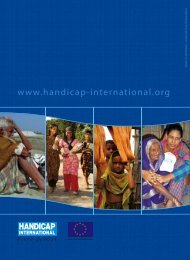Full page photo print - Harvard Law School Project on Disability
Full page photo print - Harvard Law School Project on Disability
Full page photo print - Harvard Law School Project on Disability
You also want an ePaper? Increase the reach of your titles
YUMPU automatically turns print PDFs into web optimized ePapers that Google loves.
• Understand the provisi<strong>on</strong>s related to freedom of expressi<strong>on</strong> and opini<strong>on</strong> in the UN<br />
c<strong>on</strong>venti<strong>on</strong> <strong>on</strong> the Rights of Pers<strong>on</strong>s with disabilities (CRPD) .<br />
geTTing sTARTed:<br />
ThinKing AbouT fReedom of eXPRessi<strong>on</strong> And oPini<strong>on</strong><br />
The human right to freedom of expressi<strong>on</strong> and opini<strong>on</strong> addresses a number of specific but<br />
interrelated c<strong>on</strong>cepts, each of which can be subjected to differing degrees of restricti<strong>on</strong> by<br />
States:<br />
1. freedom of opini<strong>on</strong><br />
Every<strong>on</strong>e has the right to hold any opini<strong>on</strong> or view, regardless of how popular, unpleasant,<br />
or c<strong>on</strong>troversial others might find that opini<strong>on</strong>. This is a right that is absolutely protected and<br />
cannot be subjected to any form of restricti<strong>on</strong> by States, as to do so would be to permit State<br />
interference into people’s very minds and thoughts . Essentially, we all have the right to think as<br />
we please and not to be told what or how to think .<br />
2. freedom of expressi<strong>on</strong><br />
The right to freedom of expressi<strong>on</strong> has two distinct parts:<br />
a . Right to impart or share informati<strong>on</strong> and ideas of all kinds<br />
b . Right to seek and receive informati<strong>on</strong> .<br />
Clearly the right to freedom of expressi<strong>on</strong> includes the right to exchange informati<strong>on</strong> and<br />
articulate ideas and opini<strong>on</strong>s, as well as to obtain informati<strong>on</strong> so that ideas and opini<strong>on</strong>s can be<br />
developed .<br />
Unlike the right to freedom of opini<strong>on</strong>, the right to freedom of expressi<strong>on</strong> carries with it<br />
certain resp<strong>on</strong>sibilities and can be subjected to restricti<strong>on</strong>s by the State . This is because the<br />
expressi<strong>on</strong> of ideas or exchange of informati<strong>on</strong> can sometimes be harmful to others, such as<br />
when people incite hatred against others, or say untrue things that could harm the reputati<strong>on</strong><br />
of another pers<strong>on</strong> . For this reas<strong>on</strong> the State is permitted to impose some restricti<strong>on</strong>s <strong>on</strong> the<br />
right to expressi<strong>on</strong> in the interests of public safety, order, health, morals, or protecti<strong>on</strong> of the<br />
fundamental rights and freedoms of others . However, such restricti<strong>on</strong>s must be provided by law<br />
and actually necessary to protect those interests . In additi<strong>on</strong>, any restricti<strong>on</strong>s imposed by the<br />
State should not be so great as to effectively erase the right .<br />
The right to freedom of expressi<strong>on</strong> and opini<strong>on</strong> is critical to the enjoyment of other human rights<br />
by people with disabilities . For example, it would be hard to imagine the forming and effective<br />
functi<strong>on</strong>ing of disabled peoples organizati<strong>on</strong>s or trade uni<strong>on</strong>s, without the ability of members<br />
to participate in the sharing and exchange of informati<strong>on</strong> and ideas . Similarly, the ability of<br />
people with disabilities to participate in political and public life, such as through voting and public<br />
service, would be severely hampered if candidates could not express their views and voters<br />
could not access informati<strong>on</strong> about the issues . The formati<strong>on</strong> and exchange of ideas is also<br />
essential to the right to educati<strong>on</strong>, where research and debate are critical comp<strong>on</strong>ents of many<br />
academic envir<strong>on</strong>ments . In the same way, the development and exchange of ideas is critical to<br />
the development of culture and can provide an important means of expressi<strong>on</strong> . Indeed, unless<br />
people with disabilities enjoy the right to freedom of expressi<strong>on</strong> and opini<strong>on</strong>, no State can<br />
comply with its legal obligati<strong>on</strong> under the C<strong>on</strong>venti<strong>on</strong> <strong>on</strong> the Rights of Pers<strong>on</strong>s with Disabilities,<br />
PART 2: The c<strong>on</strong>venTi<strong>on</strong> <strong>on</strong> The RighTs of PeRs<strong>on</strong>s wiTh disAbiliTies<br />
61




